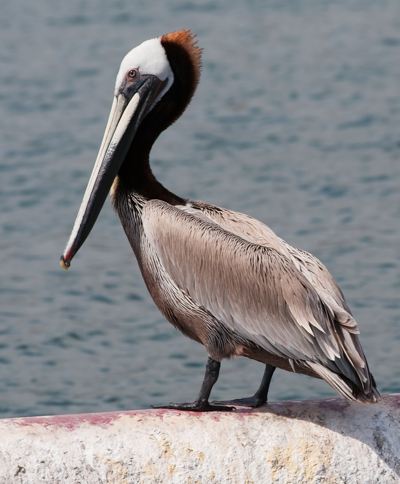Hungry Pelicans Hit the Streets
Loss of Harbor’s Bait Dock Sends Birds Searching for Alternative Food Sources
Distressed pelicans gathered on Cabrillo Boulevard Thursday due to winter storms and diminishing food sources. One of the main causes of the unusual event was reportedly the city’s removal of a key food source for local pelicans — the harbor’s bait dock — which was moved in anticipation of this week’s storms.
According to Julia Parker of the Santa Barbara Wildlife Care Network, pelicans often face difficulty this time of year because of the harsh weather and the migration of their two main food sources, sardines and anchovies. In addition, said Parker, many of the pelicans this year are less than a year old, and have thus never dealt with winter weather.
Last year, many pelicans followed their food up north to Washington, only to suffer from frostbite and famine on the way back south. This year’s events have been more extreme. The Santa Barbara Wildlife Care Network — the only pelican rehabilitation facility on California’s central coast — currently has twenty-five pelicans at their Seabird Satellite Facility. The Wildlife Care Network is a nonprofit, volunteer organization.

The California subspecies of the brown pelican (Pelecanus occidentalis californicus) was classified as federally endangered in 1970 and as endangered by the state of California in 1971. Nearly wiped out by DDT and habitat loss, pelican populations have recovered greatly since then. On February 5, 2009, they were delisted from the U.S. Fish and Wildlife Service’s Endangered Species List, largely due to their thriving nesting grounds on Santa Barbara and Anacapa Islands.
This recovery, however, may come with its consequences. Parker speculated that one of the main reasons why this storm hit the pelicans so hard this week may be their reliance on the harbor’s bait dock as a source of food. While normally the pelicans should migrate north with their food sources, Parker said, many of them may not have migrated because one significant food source was still available. The sudden disappearance of this food source may have led to the injury and distress of many pelicans on Thursday.
The Wildlife Care Network is asking for volunteer help in transporting inured birds as well as donations. They can be reached on their helpline at (805) 681-1080.



